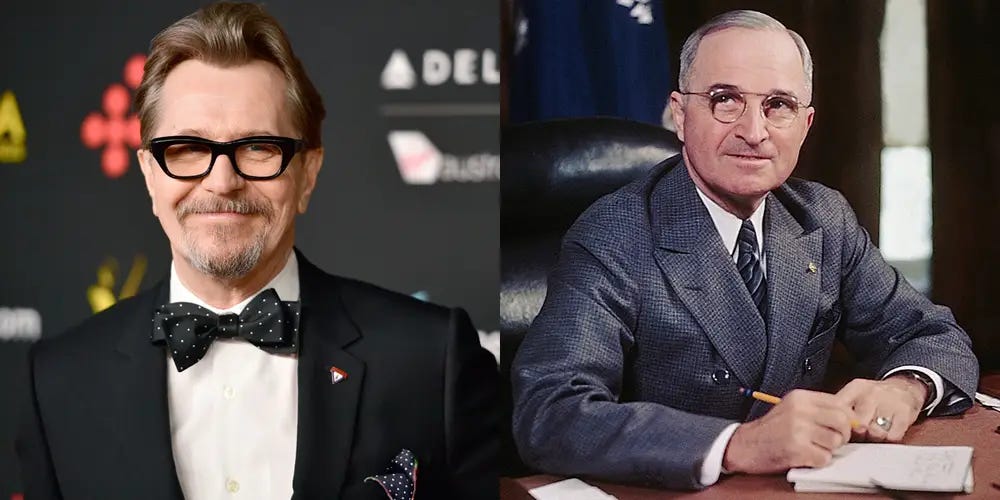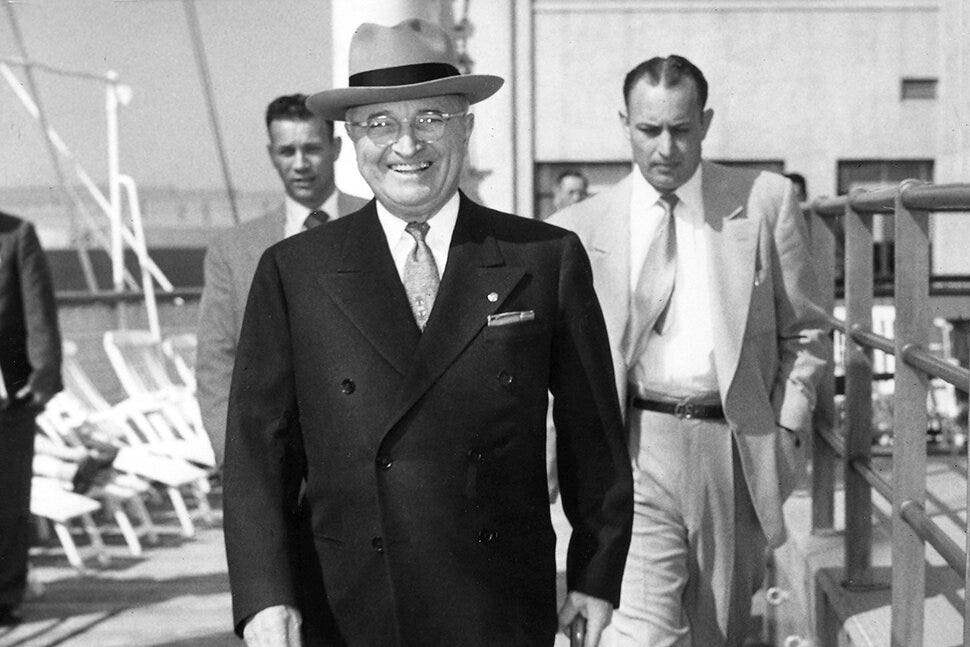Reprinted with permission from Greg Mitchell’s newsletter Oppenheimer: From Hiroshima to Hollywood.

Seventy-eight years ago this week, President Harry S Truman exulted when he heard the first report that the atomic bomb he had ordered dropped over Hiroshima by a B-29 bomber had exploded as planned and on target, most likely devastating most of this large city. Truman was on the ocean, returning to Washington from the Potsdam Conference in Germany, where he had secured Joseph Stalin’s promise to declare war on Japan around August 10. An article in the press the day after the first atomic attack depicted Truman, his voice “tense with excitement,” personally informing his shipmates about the atomic attack. “The experiment,” he announced, “has been an overwhelming success.”
Missing from this account was Truman’s burst of triumphalism when the news of the bombing first reached the ship: “This is the greatest thing in history!”
Truman’s official announcement, released while he was still at sea, again showed pride in America’s achievement, besides labeling poor Hiroshima as just a “military base,” not a city. The atomic bomb, he declared, represented “a harnessing of the basic power of the universe.” America had “won the greatest scientific gamble in history.” And Japan had now been repaid for Pearl Harbor “many fold.”
From that moment on, Truman rarely (some would say, never) looked back from a different angle, inevitably responding to questions about ordering two bombs dropped over Japan – from the media or in sometimes hostile letters to him at the White House, which I’ve read – by affirming that decision, or even what we would now call “doubling down.”
He said he “didn’t have any doubt” about the wisdom of the decision – unlike those he pictured as “eggheads” or “Monday morning quarterbacks.” He called it the “most terrible decision that any man in the history of the world had to make” but “I’d do it again” and “I would not hesitate.” On one occasion, asked how long it took him to decide to use the new device, he simply snapped his fingers.
And, in a scene depicted in Christopher Nolan’s new movie with some accuracy, when J. Robert Oppenheimer exclaimed during a private meeting with the president that he feared he had “blood on my hands,” Truman (by varying accounts) either offered to pass him a handkerchief or simply told him to quit worrying, the decision was his. After the physicist left, in any event, Truman complained to a top adviser that the “Father of the Atomic Bomb” was a “crybaby scientist.” (I must add, however, that I found Gary Oldman’s portrayal of Truman in the Nolan movie as far too buffoonish, and I say this as no fan of Harry S.)
In a later interview Truman cited the Japanese soldiers as vicious fighters and “I thought that wiping out complete cities with the bomb would be better.” And in 1959, long out of office, he declared (not for the last time) that “I never lost any sleep over my decision,” perhaps the line most associated with Truman and the bomb. But Truman went further: He didn’t want anyone to lose any sleep over it. In private, he instructed the pilot of the plane that dropped the first bomb, Paul Tibbets, “Don’t you ever lose any sleep over the fact that you planned and carried out that mission. It was my decision. You had no choice.”
Many years later, I asked Tibbets about – you know – how well he slept, and he replied, fine, thanks for asking.
Yet, in the same period Truman would assert, “You have got to understand this is not a military weapon. It is used to wipe out women and children and unarmed people.” He even met with a group of Japanese hibakusha (survivors) visiting the U.S. and, surprisingly, said he would be willing to travel to Hiroshima for a television special if asked. Then he instructed an aide, “But I won’t kiss their ass.” Classic Truman. The trip never happened.
And then this interesting episode. When the Hiroshima City Council sent him a polite but firm letter of protest over his latest statement that he felt “no compunction whatever” about ordering the use of the bombs, he replied with a fervent defense, blaming Japan for starting the war (the U.S. was “shot in the back”), for which they had to pay with the “sacrifice” of Hiroshima and Nagasaki. He even repeated the official claim that the two cities were mainly “devoted to war work.” The Hiroshima council replied by acknowledging the evil of Pearl Harbor, then asked if he truly believe that the slaughtering of 200,000, mainly women and kids, was really a “humane” act? Truman did not respond.

Truman continued to keep a file of letters hailing or hitting his decision, and sometimes replied to them. He accused one writer of “misplaced sentiment” and called another protester “Just an ignorant Cluck” (this was the writer’s last name). The file was titled, The Jap Bomb Affair. I read its contents in one of my two visits to the Truman Library in Independence, MO.
Now, you would think from all to this that Truman truly did not have any second thoughts about the decision. And why would he? Opinion polls showed that a strong majority of Americans, from the first day and continuing for decades, endorsed that decision. It is interesting, therefore, that he and his allies in making that decision acted very defensive in that brief period before the official narrative (i.e. only the bomb could have ended the war in that time frame and save hundreds of thousands of American lives) became so rarely challenged.
Three examples among several stand out.
– If the civilian casualties were something to accept as the price of winning the war, why did the U.S. go to such extremes in exercising press censorship over all postwar reports from the atomic cities, and limit, ban or suppress photographs and footage, sometimes for several decades, even film shot by the American military (see my Atomic Cover-up)?
— If the decision was such a “slam dunk,” why did Truman and the White House, in an unprecedented move, force MGM in 1946 to re-shoot the key scene in the first movie drama on the bomb, The Beginning or the End, to present his decision in an (even) more positive light? The movie was already stuffed with falsifications ordered by the U.S. military (the subject of my latest book). Then they got the movie studio to fire the actor playing Truman for allegedly lacking “military bearing.”
– If there was little reason to worry about the verdict of history, why did Truman and his allies, later in 1946, feel they had to induce the reluctant former Secretary of War, Henry L. Stimson, to write a lengthy cover story for Harper’s magazine to counter the popularity of John Hersey’s epochal “Hiroshima” article in The New Yorker which briefly threatened the official narrative? (By the way, the Stimson article succeeded in its mission.)
So: There is little evidence that Truman ever truly regretted his order to utilize the bomb. But his active participation in warding off any threats to the wisdom of that decision – and at times mocking some who raised questions relating to necessity or morality – suggest that he knew that it was at least vulnerable to serious probing and by no means a “settled question” (although many in the media treat it that way today).
One wonders, as well, if Truman might have felt, even slightly, that perhaps he had not been well served by his advisers, who (to judge by his writings or statements) may not have fully impressed on him the honest details of the U.S. targeting for the atomic bombs – the very center of a city, not a largely military or industrial zone – which guaranteed high civilian casualties.
It’s haunting to learn that, two weeks before the attack on Hiroshima, he wrote in his diary about the new weapon: “I have told the Sec. of War, Mr. Stimson, to use it so that military objectives and soldiers and sailors are the target and not women and children…he & I are in accord. The target will be a purely military one….”
Then, in August, he replied to a letter from a church official protesting the Hiroshima bomb that “nobody is more disturbed over the use of the Atomic bombs than I am.” When asked at a cabinet meeting, as I reported yesterday, why he put a hold on a third bomb strike even before Japan’s surrender, he said that the thought of wiping out another 100,000 people and killing “all those kids” was too horrible.
Perhaps he never lost any sleep reflecting on that, but it might have – and should have – occupied at least a few minutes, maybe weeks, of his waking hours.
Thanks for reading Oppenheimer: From Hiroshima to Hollywood! Subscribe for free to receive new posts and support my work.
Greg Mitchell is the author of a dozen books, including “Hiroshima in America,” and the recent award-winning The Beginning or the End: How Hollywood – and America – Learned to Stop Worrying and Love the Bomb, and has directed three documentary films since 2021, including two for PBS (plus award-winning “Atomic Cover-up”). He has written widely about the atomic bomb and atomic bombings, and their aftermath, for over forty years. He writes often at Oppenheimer: From Hiroshima to Hollywood.
